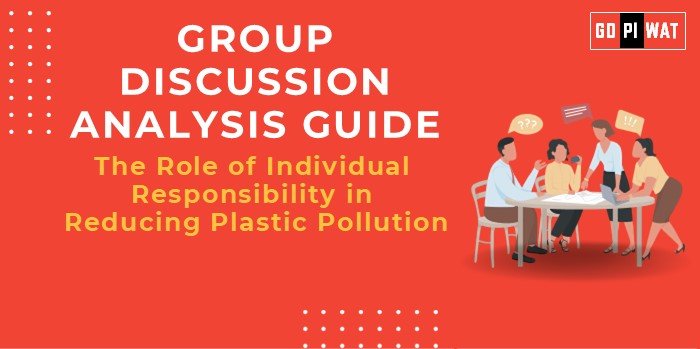📋 Group Discussion Analysis Guide
The Role of Individual Responsibility in Reducing Plastic Pollution
🌍 Introduction to the Topic
- 🌐 Opening Context: Plastic pollution has become a global environmental crisis, with over 8 million tons of plastic entering the oceans annually. The role of individual responsibility is critical in addressing this challenge, as collective actions can significantly reduce environmental harm.
- 📖 Topic Background: Plastic pollution traces back to the mid-20th century when plastic manufacturing surged. Today, single-use plastics dominate waste streams, despite numerous recycling campaigns. Increasing awareness has led governments and NGOs to advocate for individuals to adopt sustainable practices such as reducing, reusing, and recycling.
📊 Quick Facts and Key Statistics
- 🌍 Global Plastic Waste Production: 380 million tons annually – highlights the scale of the issue.
- ♻️ Recycling Rates: Only 9% of plastic waste is recycled globally – indicates inefficiencies in waste management.
- 🌊 Marine Pollution: Plastic constitutes 80% of all marine debris – underscores the need for immediate action.
- 🇮🇳 India’s Plastic Ban (2022): Ban on single-use plastics – showcases policy-driven change.
🌍 Stakeholders and Their Roles
- 🏛️ Government: Enforces policies and bans on plastic usage.
- 🏭 Manufacturers: Innovates in producing biodegradable alternatives.
- 👥 Citizens: Reduces plastic use and ensures proper disposal.
- 🌱 Environmental NGOs: Advocates for awareness and cleanup initiatives.
🏆 Achievements and Challenges
Achievements:
- 🌟 Policy Success: India’s 2022 ban on single-use plastics.
- 🌊 Community Cleanup Drives: Groups like Ocean Conservancy have removed over 300,000 tons of marine debris.
- ♻️ Recycling Innovations: Biodegradable alternatives have gained traction in markets like Europe.
Challenges:
- ♻️ Low Recycling Rates: Lack of consumer participation and global inefficiencies.
- 📜 Inconsistent Policies: Enforcement varies across regions.
- 🏭 Industry Resistance: Dependence on plastic packaging creates barriers to change.
📖 Global Comparisons:
- 🇯🇵 Japan: Achieves a recycling rate of 84% through stringent segregation.
- 🇳🇴 Norway: Success in plastic bottle recycling due to financial incentives.
📖 Case Studies:
- 🇮🇳 Kerala, India: Local communities lead extensive waste segregation initiatives.
💬 Structured Arguments for Discussion
- ✅ Supporting Stance: “Individual actions such as reducing plastic use and practicing proper disposal significantly mitigate pollution.”
- ❌ Opposing Stance: “The responsibility lies more with corporations and governments, as individual efforts alone cannot offset large-scale pollution.”
- ⚖️ Balanced Perspective: “While individual responsibility is essential, it must be complemented by systemic changes in production and waste management.”
🗣️ Effective Discussion Approaches
Opening Approaches:
- 📊 Start with a striking statistic: “Every minute, a garbage truck worth of plastic enters the ocean.”
- 📖 Refer to a success story: “Kerala’s waste segregation efforts show the power of individual action.”
Counter-Argument Handling:
- 💡 Counter systemic change arguments with: “While systemic changes are crucial, individual choices like refusing single-use plastics aggregate into significant impacts.”
📊 Strategic Analysis of Strengths and Weaknesses
- 💪 Strengths: Awareness campaigns have increased individual participation.
- ❌ Weaknesses: Insufficient infrastructure for recycling in developing countries.
- 🌟 Opportunities: Biodegradable alternatives and financial incentives.
- ⚠️ Threats: Corporate lobbying against stricter regulations.
🎓 Connecting with B-School Applications
- 🌐 Real-World Applications: Plastic pollution could be a project theme in sustainable development or environmental economics.
- 🎯 Sample Interview Questions:
- “What role do you think businesses play in reducing plastic pollution?”
- “How can financial incentives motivate individuals to reduce plastic usage?”
- 📘 Insights for B-School Students:
- Analyze behavioral economics behind recycling habits.
- Explore public-private partnerships for plastic waste management.


